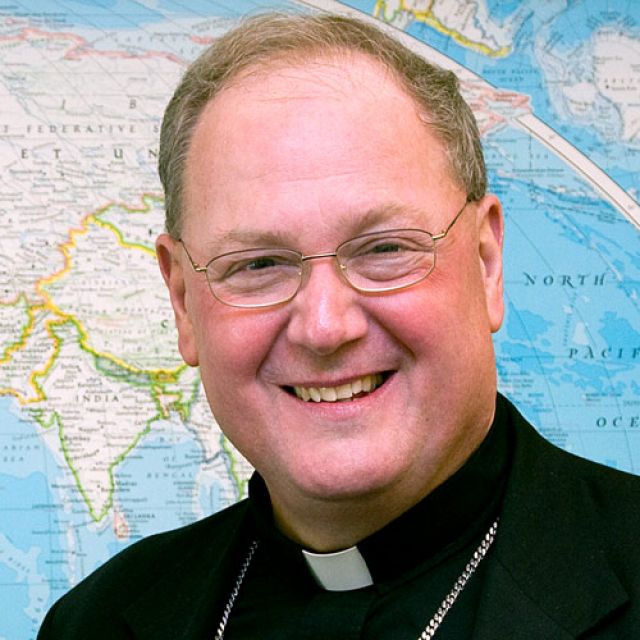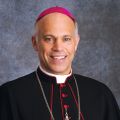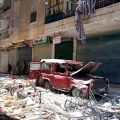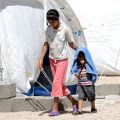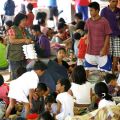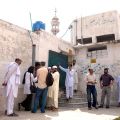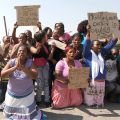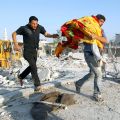News/International
NEW YORK - Cardinal Timothy Dolan of New York invited the Republican and Democratic candidates for president and vice president to sign a petition seeking civil dialogue and to refrain from personal attacks during the two months remaining in the campaign leading up to the November election.
The “Civility in America” petition developed by the Knights of Columbus calls on candidates, commentators and media representatives to focus on the important issues facing the country rather than on individual personalities.
“I am writing to you and to the other candidates for president and vice president of this great nation to ask for your support of this effort, so that the upcoming campaign will remain focused on the critical issues facing our nation and not on personal attacks,” Dolan said in letters to President Barack Obama and Vice President Joe Biden, the Democratic ticket, and Mitt Romney and Rep. Paul Ryan, the presumptive Republican nominees for president and vice president, respectively.
The petition on the Knights of Columbus web site had gained more than 20,000 signatures through Aug. 27.
Dolan’s letter said that if the candidates signed the petition he would “be most happy to convey” to Supreme Knight Carl A. Anderson and to the 1.8 million members of the organization “that you have chosen to support this valuable effort.”
The cardinal cited the results of a Knights of Columbus-Marist Poll conducted July 9-11 that found 78 per cent of Americans are “frustrated with the tone in politics today.”
The poll also found that two-thirds of people said candidates spend more time attacking their opponents than addressing key issues and that 64 per cent of people believe negative campaigning harms the political process a great deal or a significant amount.
“That this perception exists cannot be healthy for our country or our democratic political process,” Dolan’s letter said. “‘Civility in America’ is giving voice to the desire of Americans of all backgrounds and political parties for more civil discourse during this election season.”
The cardinal, who is also president of the U.S. Conference of Catholic Bishops, was to deliver the closing prayer at both the Republican National Convention in Tampa, Fla., and the Democratic National Convention in Charlotte, N.C.
Clergy from several denominations are scheduled to pray at the opening and closing of each day’s sessions of the party conventions. The tradition of such prayers goes back more than 100 years.
It is unusual for the same person to pray at both conventions in the same year, but it’s not without precedent. For example, in 1948, Philadelphia Cardinal Dennis J. Dougherty prayed with both parties when the nominating conventions met in Philadelphia.
Archbishop apologizes after drunken driving arrest
By Catholic News ServiceOAKLAND, Calif. - Archbishop Salvatore J. Cordileone, to be installed in October as archbishop of San Francisco, was arrested in San Diego early Aug. 26 for driving under the influence.
The archbishop, a San Diego native, had his mother in the car.
In an Aug. 27 statement issued from the diocese of Oakland, which Cordileone has led for the past three years, the prelate apologized “for my error in judgment” and said he felt “shame for the disgrace I have brought upon the Church and myself.”
“I will repay my debt to society and I ask forgiveness from my family and my friends and co-workers at the diocese of Oakland and the archdiocese of San Francisco,” he added. “I pray that God, in His inscrutable wisdom, will bring some good out of this.”
According to the archbishop’s statement, he was driving his mother to her home after dinner at the home of some friends, “along with a priest friend visiting from outside the country.”
Cordileone’s mother lives near the campus of San Diego State University, where police had set up a DUI checkpoint.
He admitted in his statement that he was found to be over California’s legal blood alcohol level, which is 0.08 per cent.
According to the San Francisco Chronicle, Cordileone spent the night in jail, and was released shortly before noon once he posted a $2,500 bond. He is scheduled to be arraigned on the misdemeanor charge Oct. 9 — five days after his scheduled installation as San Francisco’s archbishop. If convicted, Cordileone faces penalties of up to three years of probation, two days in jail and an $1,800 fine.
Mark McCullough, the police officer making the arrest, told the Chronicle that Cordileone appeared intoxicated but was amiable.
“He was very calm, somewhat apologetic at the time,” McCullough said. “He said he’d been drinking. But he wasn’t a stumbling, falling-down drunk.”
Residences of Melkite, Maronite archbishops in Aleppo ransacked
By Catholic News ServiceVATICAN CITY - Fighting in Aleppo, Syria, has not spared the residences of the local Melkite and Maronite Catholic archbishops, according to the Vatican's Fides news agency.
The residence of Melkite Archbishop Jean-Clement Jeanbart was ransacked during clashes Aug. 23. The archbishop and several priests who live in the building had fled a few hours earlier to a Franciscan residence in a safer neighbourhood, Fides reported Aug. 27.
Franciscan Father George Abu Khazen, who cares for the city's Latin-rite Catholics and offered shelter to the Melkites, told Fides that Jeanbart was very worried and shaken.
"He kept repeating one word: 'Why?' ”
The archbishop has gone to Lebanon, but one of his assistants was able to return to the house once the Syrian military regained control of the area. He said the house had been broken into and a variety of objects, including computers and a projector, were missing, Khazen said.
The Maronite archbishop's residence and a museum of Byzantine Christian art in the same neighbourhood were both ransacked as well, Fides said.
Khazen said it still seems like there is no solution to the Syrian conflict in sight because no one, nationally or internationally, seems able to pressure either side into beginning a real dialogue.
The tensions began in March 2011 as part of the pro-democracy Arab Spring movement that swept across North Africa and the Middle East.
Fides, the news agency of the Congregation for the Evangelization of Peoples, said it spoke to another member of "the local hierarchy, who asked to remain anonymous for security reasons." He told Fides that "groups of jihadists" — militant Islamic fighters — from Chechnya, Pakistan, Lebanon, Afghanistan, Tunisia, Saudi Arabia and Libya have joined the fighting in an attempt to increase "hatred and sectarian conflict."
The groups, he said, "have the sole aim of bringing chaos, destruction, atrocities and paralysing social life. The Syrian civilian population is the victim, but they won't fall for this trap."
Syrian women, children caught in a situation they never imagined
By Mark Pattison, Catholikc News ServiceWASHINGTON - While media images of the Syrian civil war are mainly those of men with guns, workers from Catholic Relief Services have seen "predominantly women and children, fleeing," said a communications officer who recently returned from the Middle East.
Syrian women, hailing from a society that gives them little chance to make their voices heard, were "tugging on my sleeve, begging me to tell their stories" in the United States, said the manager, Caroline Brennan, who visited with the refugees in Lebanon and Jordan.
The 250,000 Syrian refugees, part of a larger group of 1.5 million Syrians displaced from their homes due to the fierce fighting enveloping their country, have been "blindsided by what is happening to them," she said.
These Syrians were "viewing (the war) from a distance, never thinking this would affect their lives," Brennan said. "Many of these people, literally fleeing for their lives, are middle class. They have nice homes. The country has no debt. They never expected to see this happening."
Brennan told of a pregnant Syrian refugee who got a job as a maid in exchange for shelter for her and her sons. She worked until she gave birth and went back to work again shortly thereafter.
"She had no way to see a doctor or pediatrician" until CRS stepped in," she said. "Many of these women have bullet wounds. Their children need care.
"One woman I met in Jordan ... she was with her mother and they heard gunshots and they scurried around a corner. And the woman saw her mother, lying next to her, on the ground," felled by a bullet.
"Families are trying desperately to stay together," but not always succeeding, Brennan added. Sometimes, men "stay home trying to protect their land, or they're fighting — or worse, they've been kidnapped. The women are left to lead the family. They think: What is happening to the people they love in this world?"
But she also told of a Syrian husband and father named Faizad.
"He came across the border, but his wife and (most of their) children weren't allowed to make it. But then he has a son he has to care for. He (the son) cries at night, he misses his mom," Brennan said. Workers can tell from the boy's drawings that he has seen "people with guns killing innocent people," she added.
"This is a humanitarian crisis at its heart," she said.
There are "huge social needs of the people, especially children and mothers," said Vivian Manneh, a 20-year CRS veteran currently serving as a regional program manager for the Middle East. "Kids are starting to think, 'What is going to happen to us? Where are we going to be?' There are lots of psychosocial needs, lots of basic needs such as food, clothing, shelter."
Manneh said she sees people "who are in need of food, who are praying and lacking lots of the basics. They are leaving their homes with nothing. Their children are out of school. They have no clothing. They are using fruit trees to chop as cooking gas. Their situation is dire. The humanitarian crisis is increasing a lot."
She added, "If you see people coming out with babies, they have nothing to cross (the border) with, no sustenance — they had to flee quickly."
The shelter issue is complicated. Because of the Syrian refugees' impressions of Palestinian refugee camps, they resist as long as possible going to the camps set up for them.
"There are not a lot of places to go to. The rents are increasing," Manneh said.
Because of the prior long-term stability of their country, few Syrians have relatives in other countries who can take them in.
"They will come back (to Syria) as long as they feel safe. They will go back even if they know their home is laying right on the ground and they know they don't have a place," Manneh said.
Brennan concurred. She said refugees have told her, "I'd rather sleep on the dirt of my home" as long as there was peace.
"They don't see themselves as long-term refugees," she said. "They want to go home."
Seeing the "sad sequence of deaths and injuries, including among civilians, and a huge number of people internally displaced or seeking refuge in neighbouring countries," Pope Benedict XVI appealed July 29 for an end to "all violence and bloodshed" in Syria, which has seen thousands of civilian deaths since protests against the Bashar Assad regime started in March 2011.
One irony in the situation is that an estimated one million Iraqi refugees currently live in Syria. Now, some Syrians are fleeting to Iraq.
"They (Iraqis) are very hospitable, opening their doors," Manneh said, but "we don't know how many (refugees) they are going to take."
Archdiocese of Toronto raising funds for Africa, Philippines
By Catholic Register StaffTORONTO - Toronto parishes are being encouraged to reach out to Africa and the Philippines.
The archdiocese of Toronto is channeling parish collections to the Canadian Catholic Organization for Development and Peace to help people suffering food shortages in the Sahel region of northwest Africa and flood victims in the Philippines.
In the case of the Sahel drought, which threatens the lives of 18.7 million people, collections sent in before Sept. 30 will be matched dollar-for-dollar by the Canadian government.
Funds contributed to Development and Peace for the Philippine floods are immediately available to Caritas NASSA — the main Catholic relief agency in the Philippines.
Parishes can make cheques payable to "Parish Name - Sahel Crisis Relief" or "Parish Name - Philippine Flood Relief." Cheques should be mailed to the Development Office, Catholic Pastoral Centre, 1155 Yonge St., Toronto, Ont., M4T 1W2.
Individuals can also contribute through the archdiocese, either by calling the Development Office at 1-800-263-2595 or (416) 934-3411 or online at www.archtoronto.org/humanitarian.
Work under way to free Pakistani girl accused of blasphemy
By Catholic News ServiceVATICAN CITY - Pakistani institutions and religious leaders are working together for the release of a Christian girl accused of blasphemy and to reduce the risk of Muslim-Christian violence over the incident, said the Pakistani prime minister's special advisor on minorities.
Paul Bhatti, the Catholic advisor, told the Vatican's Fides news agency Aug. 23 that those working to secure the girl's release included Muslim leaders.
Fides, the news agency of the Congregation for the Evangelization of Peoples, has reported that the girl, Rimsha Masih, is an 11-year-old with Down syndrome. She was taken into custody Aug. 18 after allegedly being found with burned pages of the Quran, the Muslim holy book. When the police took her away, hundreds of angry Muslims were reportedly gathering in the mainly poor Christian neighbourhood of Islamabad where she lived.
Hundreds of families have fled the neighbourhood, and the police presence has increased.
"The situation is under control," Bhatti told Fides.
Catholic leaders in Pakistan and human rights activists have said the country's anti-blasphemy law, which includes offenses against the Quran, has been misused to persecute Christians and other minorities in the country.
Daughter of St. Paul Sister Daniela Baronchelli, who works in Pakistan, told Vatican Radio Aug. 20: "We have been told that the girl cannot respond to the interrogation. They found her with a bag that had parts of a burned Quran inside. They don't know, however, who gave it to her or where she got it; they don't know anything."
Sr. Daniela said the angry crowd "wanted to burn her alive because they say it was a great offense against the Quran."
The unjust use of the anti-blasphemy law "unfortunately is becoming all too common. The fact is that the extremists don't want the Christians here any more, so any little thing — true or not — is enough to incite a revolt," she said.
Archbishop asks international help to stop terrorism in Nigeria
By Catholic News ServiceVATICAN CITY - The president of the Nigerian bishops' conference called for the international community to help his country improve its security operations to stop the "fundamentalist, fanatic" Boko Haram terrorist group.
The day after a Catholic church, an elementary school and a police station in Damagun were attacked, presumably by Boko Haram members, Archbishop Ignatius Ayau Kaigama of Jos told Vatican Radio: "There is high religious tension in Nigeria, but we are not at war between Christians and Muslims. The Boko Haram is at war with Christians, because they have vowed they will kill Christians because they are 'infidels.' This is a fact, but it is not the whole Islamic community."
In its two-year campaign to impose a strict interpretation of Islamic law on the entire country, Boko Haram has been blamed for more than 1,400 deaths of Christians, Muslims and police officers.
Kaigama, who was interviewed Aug. 20 in Rimini, Italy, where he addressed a meeting of the Communion and Liberation lay movement, told Vatican Radio that in his country, where the population is about half Muslim and half Christian, "there is no neat division between political problems and religious problems. They are intertwined."
"It is erroneous to always reduce every crisis in Nigeria to religion. Religion does a lot of good; we shouldn't see it as always generating crisis," the archbishop said.
In addition, he said, people must look for the root causes of tensions in Nigeria, including the economic, political and social issues that "trigger these crises, but somehow eventually they always become Christian-Muslim crises."
The vast majority of Nigerians — Christians and Muslims — want to live in peace and are frightened by the actions and agenda of Boko Haram, he said, "but somehow the violence continues to grow."
"The government seems helpless. The security agents, even though they are all over the place, don't seem to provide the security that would allow people to go about their normal business peacefully," Kaigama said.
"People are afraid that if this conflict situation continues, the consequences will be disastrous: There will be either an open, very terrible religious conflict or even a civil war that will pit the North against the South," he said.
The majority of people in the North are Muslim, while the majority of people in the South are Christian.
If there is war in Nigeria, he said, it will affect other West African nations and, perhaps, the whole continent.
"We don't want a war in Africa, that is why we are asking the international community to assist in a way that we can resolve the problems of security so that we can live happily in peace," the archbishop said.
Family Research Council shooter charged with assault, intent to kill
By Daniel Linskey, Catholic News ServiceWASHINGTON - The shooter brought 15 Chick-fil-A sandwiches and a 9mm pistol with him to the Family Research Council headquarters in Washington Aug. 15.
According to an affidavit released by the FBI the next day, the gunman said, "I don't like your politics," just before he opened fire.
After a non-fatal shooting of one guard, the gunman, later identified as Floyd Lee Corkins, was subdued.
Corkins, 28, was charged Aug. 16 with assault with intent to kill while armed. He also is charged with the federal offense of interstate transportation of a firearm and ammunition. Corkins is from Herndon, Va., a Washington suburb. If found guilty on those charges, he could face a maximum of 40 years of imprisonment. He is being held in jail without bond.
Tony Perkins, CEO of the Family Research Council, said in a statement that "reckless language" created an atmosphere of violence. He referred to the Southern Poverty Law Centre's labelling of his organization as a hate group because of its opposition to same-sex marriage.
Founded in 1983, the Family Research Council advocates for public policy "that values human life and upholds the institutions of marriage and the family." Its motto is "Advancing Faith, Family and Freedom."
Perkins also shared his gratitude for 25 gay rights groups who had released a statement through the Gay and Lesbian Alliance Against Defamation. The GLAAD statement said, "Regardless of what emerges as the reason for this shooting, we utterly reject and condemn such violence."
Chick-fil-A has recently gone from being an innocuous sandwich shop to a political lightning rod after its chief operating officer, Dan Cathy, talked about his opposition to same-sex marriage. Chick-fil-A is a donor to the Family Research Council.
The Southern fast-food chain has just one location in Washington, in The Catholic University of America's student union. It has been closed for the summer and will reopen Aug. 27 when the new school year begins.
A spokesman for the university, Victor Nakas, told Catholic News Service that the school would increase security measures.
"We have professional staff available 24/7. We'll be giving our food court more visibility," said Nakas. He noted the school does not expect any incidents but would increase patrols to their student center regardless.
South African bishops call for inquiry into mine violence
By Bronwen Dachs, Catholic News ServiceCAPE TOWN, South Africa - South Africa's bishops condemned the killings at a platinum mine in Marikana and called for a judicial inquiry into the circumstances that led to the violence.
Thirty-four people died and 78 were injured Aug. 16 when police opened fire on striking miners who, armed with machetes and homemade spears, were gathered on a rocky outcrop at the mine, 100 km northwest of Johannesburg. Another 10 people, including two policemen, had already been killed in violence at the mine since the start of an illegal strike Aug. 10.
"The senseless loss of life, especially through wanton violence, is always a tragedy and needs to be condemned in the strongest terms," the Southern African Catholic Bishops' Conference said in a statement.
"There are a lot of questions and not many answers," Bishop Kevin Dowling of Rustenburg said in a telephone interview. The mine is located in his diocese.
He and other Church leaders were aware of the standoff between two trade unions over recognition agreements at the mine and "hoped that it would be resolved in the negotiations during the week," Dowling said. The miners were also demanding higher wages.
The actions of the trade unions, the London-based Lonmin mining company and the police "need to be investigated" by an inquiry that also looks at "the living and working conditions at this mining operation," the bishops said.
"We offer to assist in the trauma counselling and community healing that will be necessary for this community and the broader South African community," the bishops said.
"We cannot allow this violence to escalate and become a normal part of our society.
"There are effective mechanisms available for facilitating and brokering amicable settlements to disputes of whatever nature, and we encourage all the parties concerned in this tragic situation to commit to acquiring these skills to ensure that similar unfortunate incidences do not occur again," they said.
Dowling said that often South Africa's industrial disputes turn violent, which "indicates deep frustration and anger."
"Terrible poverty and high levels of unemployment" in his diocese "are the cause of much tension," he said.
The secretary-general of the South African Council of Churches, the Rev. Mautji Pataki, said that he and the organization's president, Anglican Bishop Johannes Seoka of Pretoria, found workers and management at the mine "willing to engage one another, provided the level of hostility is reduced to allow peaceful interaction and resolution."
A delegation from the council, of which the Southern African Catholic Bishops' Conference is a member, visited the mine Aug. 17 and said in a statement afterward that the council would "seek to help to create an atmosphere conducive to negotiation."
The council called on the police "to exercise restraint in the use of force as they seek to maintain law and order." It said it is "only through meaningful and peaceful dialogue that all parties affected by this conflict can find a solution."
South African President Jacob Zuma cut short a visit to a regional summit in neighbouring Mozambique to visit the mine.
In a front-page editorial Aug. 17, the Sowetan newspaper said that in South Africa, 18 years after the end of apartheid, "the value of human life, especially that of the African, continues to be meaningless." Africans "are pitted against each other over who is the rightful representative of workers. They are also fighting for a bigger slice of the mineral wealth of their own country. In the end the war claims the very poor African — again," the newspaper said.
South Africa is home to 80 per cent of the world's known reserves of platinum. Rising power and labour costs and a steep decline this year in platinum prices have left many mines struggling to stay afloat, according to Reuters, the British news agency.
Nun says Syrian insurrection results are worse than Assad's regime
By Sarah MacDonald, Catholic News ServiceDUBLIN - A Carmelite nun said the armed insurrection in Syria is "producing a totalitarianism that is worse" than that of Bashar Assad's regime.
Mother Agnes Mariam of the Cross, superior of the community at the monastery of St. James the Mutilated in Qara, Syria, also appealed to the international community to stop supporting violent militias linked to al-Qaida and other extremist groups guilty of atrocities against innocent Syrian civilians.
"We know now that those people are not fighting for freedom, they are fighting for their values, and those values are not even those of moderate Islam, they are fundamentalist," the Lebanese-born nun said.
"What has really scandalized us and leaves us in distress is that the Western world seems to be encouraging this rise of sectarian violence just to topple the (Assad) regime."
Mother Agnes Mariam, spokeswoman for the Catholic Media Centre of the Melkite Catholic archdiocese of Homs, said the insurgents were targeting religious minorities and executing moderate Sunnis such as journalists, researchers, doctors and engineers to pressure their families and communities into supporting an Islamist state. She claimed they were "destroying the delicate religious and ethnic balance" in Syria.
"You don't know when it will be your turn to be considered a collaborator," she explained of the arbitrary abductions, beheadings and killings being carried out as part of a campaign of terror by the insurgents against those they claim are working for the Assad regime. "It is a life of fear and insecurity."
She described the international community's public utterances in support of peace as "paradoxical" in view of the financial support recently pledged by Britain and the United States to the insurgents, whom she warned are "paralysing civilian life." The Sunni Muslim rebels are also backed by Arab states such as Saudi Arabia, Qatar and Turkey.
"This money will be used for weapons which will increase the violence," Mother Agnes Mariam told Catholic News Service in Dublin in mid-August after a meeting with the papal nuncio, Archbishop Charles Brown, and with representatives of the Irish bishops' justice and peace council.
On Aug. 15, a panel of UN experts based in Geneva concluded that government forces and pro-government militias as well as armed insurgents had committed war crimes in the Syrian conflict between Feb. 15 and July 20. However, only the panel's chairman was allowed to enter Syria to conduct interviews; other panelists were denied access.
In late July, the UN said an estimated 2.5 million Syrians have been injured, displaced or face problems securing food or basic necessities since the uprising — now deemed a civil war by the Red Cross — began in March 2011. Activists estimate 20,000-28,000 people have died in the conflict.
Mother Agnes Mariam said a prelate in Aleppo told her that although the city "did not really enter in the revolution demonstrations, as the majority of the city's population wanted to stay neutral," the city had been "invaded by thousands of rebels, most of whom are not Syrian," and that they were "forcing people to either collaborate with them or killing them."
"My appeal is for the civilian population," Mother Agnes Mariam said. "This is not the way to bring freedom or democracy to a country which has been under a yoke of totalitarianism for 50 years."
She said that, in Homs, she had witnessed "terrible things."
"I have seen hundreds of corpses of civilians who were shot, cut in pieces — just because they were civilians going to their work," she said.
Likening Homs to Stalingrad, Russia, or Dresden, Germany, after the Second World War, she said ancient Catholic, Orthodox and Presbyterian churches had been desecrated and the conflict had caused 130,000 Christians to flee the area.
"The only solution is for a complete ceasefire and dialogue from within Syria and for all factions to enter into a movement of reconciliation and of dialogue," she suggested. "We want first of all to stop violence."
She also urged support for an alternative solution to the violence.
"Mussalaha, which in Arabic means reconciliation, is a community-based non-violent initiative which has emerged from within civil society. Religious, family and ethnic leaders have been meeting to promote peace and reconciliation within Syrian society. It is an alternative to the violence of the insurrection or international military intervention," she said.
The Church-backed initiative emerged in June in Homs following the attendance of representatives of various religions at a meeting that resulted in a number of joint declarations on building peace and mutual respect in Syria.
Born in Lebanon of a Lebanese mother and a Palestinian father, Mother Agnes Mariam lived through the Lebanese civil war of 1975-1990. She joined the Carmelites in 1971, and in 1994 she established a new monastic foundation in the sixth-century monastery of St. James the Mutilated in Qara.
Vietnamese authorities replace chapel items with images of Ho Chi Minh
By Catholic News ServiceHANOI, Vietnam - Government authorities from a district in Vietnam's Central Highlands forced ethnic villagers to remove Catholic pictures and items from their chapel, and authorities replaced them with images of the late communist leader Ho Chi Minh.
A Church source told the Asian church news agency UCA News that government authorities from Kon Thuc hamlet, led by district security officials, visited the Catholics Aug. 12 after Mass and asked them to remove a cross and Marian image from the chapel. The source said authorities threatened to imprison the lay leader if Catholics from the leper village of Dak Pnan did not comply.
Villagers had to carry the cross, Marian picture, altar and tabernacle to the lay leader's house, the source told UCA News.
Authorities then put two pictures of Ho Chi Minh in the places where the cross and Marian picture had been.
On Aug. 13, authorities dismantled the bell of the chapel after local Catholics refused to do it. The bell was also taken to the lay leader's house.
One lay leader said authorities told parishioners that the building was to be used "for village activities, not for worship."
Local Catholics said the building, sponsored by a France-based charitable organization, was built in 1999 for villagers, most of them ethnic Bahnar Catholics, to worship and hold their common activities.
Since 2007, priests from other places started to visit weekly and provide pastoral services for villagers at the building, which has been used only for worship.
On Aug. 13, Bishop Michel Hoang Duc Oanh of Kon Tum visited local villagers and encouraged them to live out their faith bravely and work for the common good. He has not made any public response to the events.

